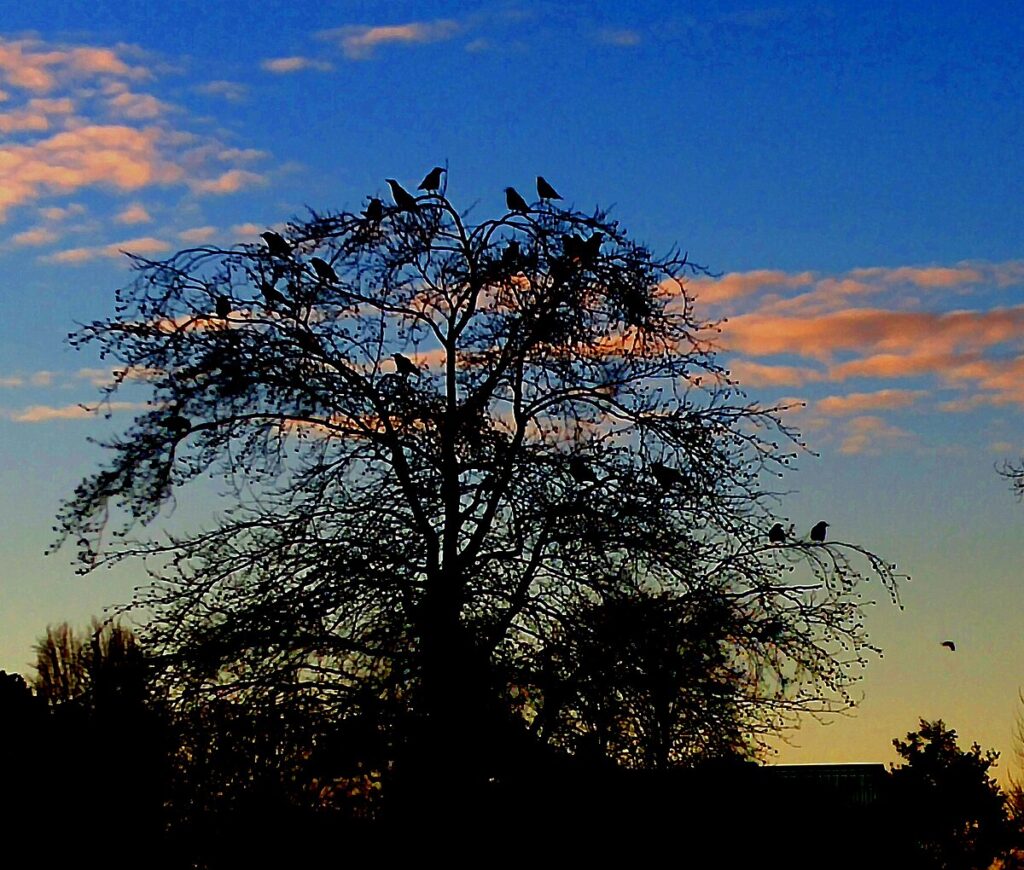
Photo credit: WikiCommons
Ecofeminist spiritualities characteristically reject death as an ultimate end point. This is an intentional alignment with fluid natural cycles over linear, patriarchal timelines. Time is thought to be cyclical, organized around the rotation of the Earth, sun, moon, and other stars and planets of the universe. There is no end point, as energy and matter are reabsorbed and reworked into the flowing fabric of existence.
Comfort with the inevitability of death and the connection that humans have with the life cycles of Earth and the wider universe creates a worldview that is rather different from Judeo-Christian traditions that understand human (and nonhuman) life as finite on Earth. British witch Sybil Leek explains: “Once we become obsessed with thoughts of death as an ultimate end, we defeat our ability to become involved in life” (1973: 140).
For Nonhuman Animals, the patriarchal quest to defeat aging, illness, disability, and death itself has inspired all manner of heroic efforts in scientific exploration, efforts that have been used to rationalize grotesque, systematized brutality in vivisection laboratories (Collard 1988). It is an all too familiar pattern to vegan feminists: “In an earlier time, we burned witches in the name of religion,” muses Kheel, “Today we torture animals in the name of science” (1983a: no page).
An alternative worldview that emphasizes an infinity of existence could undermine this human supremacist approach. It animalizes humans, in some ways, reminding and celebrating that all sentient beings are part of an ongoing cycle of life. However, it also has the potential to depersonalize other-than-human animals. Leek adds: “As far as the spirit is concerned, the body is expendable; when we reach the point which we call death, the body is sloughed off like a coat we no longer need” (1973: 140). For Nonhuman Animals, whether or not this death is premature or violent (as is the case when they are killed for food) is not always considered relevant and their death be dismissed as “nature’s way.”
The killing of other animals is thus liable to diminishment even in goddess spiritualities. Indeed, Weinstein (2020) notes that death should not be seen as “horrible or frightening,” as it is a natural and necessary aspect of life (105). “Both power and suffering can be hurtful,” she notes, and “both, as parts of life, should be respected” (1973: 181). Suffering, in other words, must be accepted, if not embraced. Ecofeminist and pagan practices that remain committed to anthropocentrism, specieism, and non-veganism invariably default to the “natural” way of animal death, especially if it can excuse human violence against other animals.
While it is true that suffering in life cannot be avoided, some witches, ecofeminists, and certainly vegan feminists differentiate between suffering that can be avoided and that which is unfortunately unavoidable. As these traditions are rooted in activism, they often advocate intervention where possible. Starhawk, by way of example, emphasizes that suffering may exist, but “it is not our task to reconcile ourselves to it, but to work for change” (1999: 37). Indeed, Starhawk is perhaps the strongest advocate for using magic in the service of change. For her, witchcraft is a form of direct action and civil disobedience that can resist despair.
For Nonhuman Animals, however, their suffering is more easily reconciled if they are categorized as human foodstuffs. Starhawk (2004), for instance, is tolerant of veganism, but not vegan herself and suggests that veganism and vegetarianism are diets that are impractical for the environment and not nutritious enough for women. Although some ecofeminists, some pagans, and some witches do adopt veganism or perhaps even vegetarianism, most of them do not. Thus, philosophies of cyclical living (and dying), while useful in ecologizing all life on earth–humans included–it can just as easily be used to reinforce existing social hierarchies than to deconstruct them.
Works Cited
Collard, A. 1988. Rape of the Wild. The Women’s Press: London.
Kheel, M. 1986. “From Healing Herbs to Deadlyl Drugs.” Feminists for Animal Rights Newsletter 2 (2): 1-14.
Leek, S. 1973. The Complete Art of Witchcraft. New York: New American Library.
Starhawk. 1999. The Spiral Dance. San Francisco: HarperOne.
Starhawk. 2004. The Earth Path. San Francisco: HarperSanFrancisco.
Weinstein, M. 2020. Positive Magic. Newburyport: Weiser Books.
Dr. Wrenn is Senior Lecturer in Sociology at the University of Kent. She received her Ph.D. in Sociology with Colorado State University in 2016. She was awarded Exemplary Diversity Scholar, 2016 by the University of Michigan’s National Center for Institutional Diversity. She served as council member with the American Sociological Association’s Animals & Society section (2013-2016) and was elected Chair in 2018. She is the co-founder of the International Association of Vegan Sociologists. She serves as Book Review Editor to Society & Animals and is a member of the Research Advisory Council of The Vegan Society. She has contributed to the Human-Animal Studies Images and Cinema blogs for the Animals and Society Institute and has been published in several peer-reviewed academic journals including the Journal of Gender Studies, Environmental Values, Feminist Media Studies, Disability & Society, Food, Culture & Society, and Society & Animals. In July 2013, she founded the Vegan Feminist Network, an academic-activist project engaging intersectional social justice praxis.
She is the author of A Rational Approach to Animal Rights: Extensions in Abolitionist Theory (Palgrave MacMillan 2016), Piecemeal Protest: Animal Rights in the Age of Nonprofits (University of Michigan Press 2019), Animals in Irish Society: Interspecies Oppression and Vegan Liberation in Britain’s First Colony (State University of New York Press 2021), and Vegan Witchcraft: Contemporary Magical Practice and Multispecies Social Change (Routledge 2026).
Receive research updates straight to your inbox by subscribing to my newsletter.

